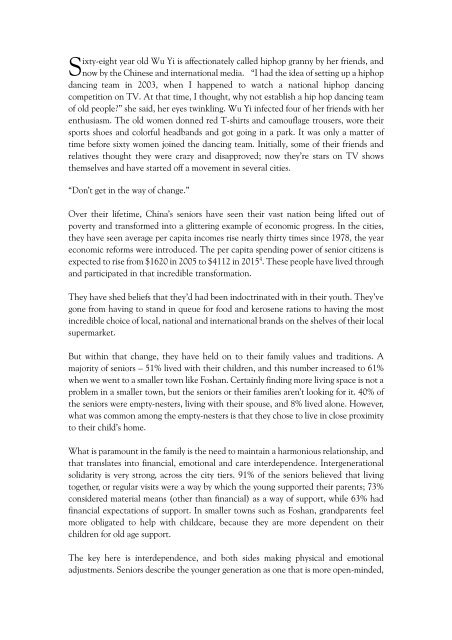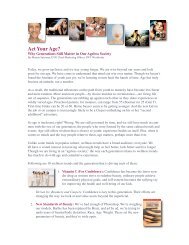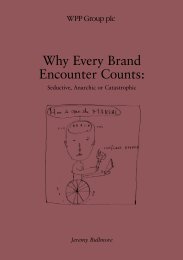Embracing Change, Realizing Dreams - WPP.com
Embracing Change, Realizing Dreams - WPP.com
Embracing Change, Realizing Dreams - WPP.com
Create successful ePaper yourself
Turn your PDF publications into a flip-book with our unique Google optimized e-Paper software.
Sixty-eight year old Wu Yi is affectionately called hiphop granny by her friends, andnow by the Chinese and international media. “I had the idea of setting up a hiphopdancing team in 2003, when I happened to watch a national hiphop dancing<strong>com</strong>petition on TV. At that time, I thought, why not establish a hip hop dancing teamof old people?” she said, her eyes twinkling. Wu Yi infected four of her friends with herenthusiasm. The old women donned red T-shirts and camouflage trousers, wore theirsports shoes and colorful headbands and got going in a park. It was only a matter oftime before sixty women joined the dancing team. Initially, some of their friends andrelatives thought they were crazy and disapproved; now they’re stars on TV showsthemselves and have started off a movement in several cities.“Don’t get in the way of change.”Over their lifetime, China’s seniors have seen their vast nation being lifted out ofpoverty and transformed into a glittering example of economic progress. In the cities,they have seen average per capita in<strong>com</strong>es rise nearly thirty times since 1978, the yeareconomic reforms were introduced. The per capita spending power of senior citizens isexpected to rise from $1620 in 2005 to $4112 in 2015 4 . These people have lived throughand participated in that incredible transformation.They have shed beliefs that they’d had been indoctrinated with in their youth. They’vegone from having to stand in queue for food and kerosene rations to having the mostincredible choice of local, national and international brands on the shelves of their localsupermarket.But within that change, they have held on to their family values and traditions. Amajority of seniors – 51% lived with their children, and this number increased to 61%when we went to a smaller town like Foshan. Certainly finding more living space is not aproblem in a smaller town, but the seniors or their families aren’t looking for it. 40% ofthe seniors were empty-nesters, living with their spouse, and 8% lived alone. However,what was <strong>com</strong>mon among the empty-nesters is that they chose to live in close proximityto their child’s home.What is paramount in the family is the need to maintain a harmonious relationship, andthat translates into financial, emotional and care interdependence. Intergenerationalsolidarity is very strong, across the city tiers. 91% of the seniors believed that livingtogether, or regular visits were a way by which the young supported their parents; 73%considered material means (other than financial) as a way of support, while 63% hadfinancial expectations of support. In smaller towns such as Foshan, grandparents feelmore obligated to help with childcare, because they are more dependent on theirchildren for old age support.The key here is interdependence, and both sides making physical and emotionaladjustments. Seniors describe the younger generation as one that is more open-minded,
















